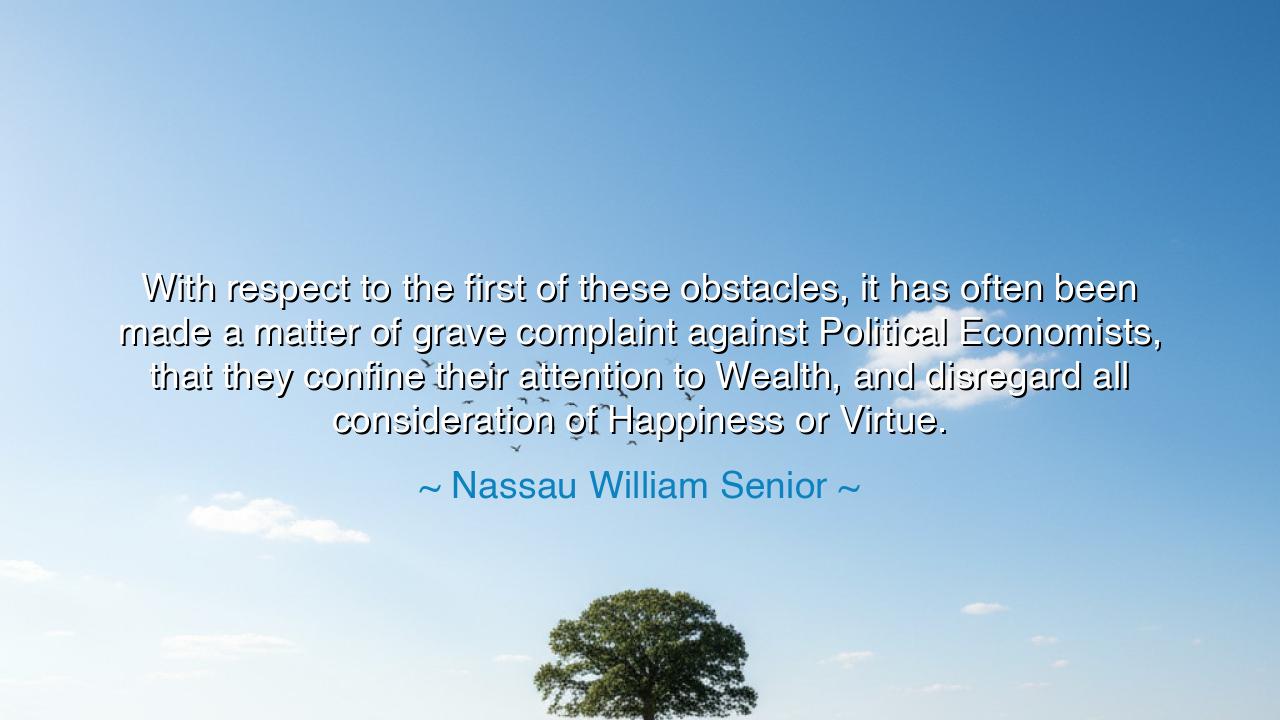
With respect to the first of these obstacles, it has often been
With respect to the first of these obstacles, it has often been made a matter of grave complaint against Political Economists, that they confine their attention to Wealth, and disregard all consideration of Happiness or Virtue.






When Nassau William Senior declared, “With respect to the first of these obstacles, it has often been made a matter of grave complaint against Political Economists, that they confine their attention to Wealth, and disregard all consideration of Happiness or Virtue,” he gave voice to a timeless tension in human affairs: the danger of mistaking means for ends, of reducing life to the pursuit of coin while neglecting the higher treasures of the soul. His words echo through the ages, warning that a society consumed by wealth alone risks losing sight of the very purpose for which wealth is sought—happiness and virtue.
The Political Economists of Senior’s time sought to understand the laws of production, trade, and distribution. They mapped the flow of money, measured labor, and weighed profits. Yet critics charged them with blindness, for what good is it to increase the stores of gold if the hearts of the people remain impoverished? What use is a full treasury if the land is barren of joy, if the cities are rich in industry but poor in morality? Senior acknowledged this complaint as grave, for it struck at the very foundation of economics: is it a science of numbers, or a philosophy of life?
The ancients wrestled with this same question. Aristotle, in his Politics, distinguished between oikonomia—the art of managing a household for the good of life—and chrematistics—the endless pursuit of money for its own sake. He warned that when the latter rules unchecked, society loses its soul. In Senior’s words, we hear Aristotle’s warning revived: that to disregard Happiness or Virtue is to hollow out the heart of society, leaving only machinery that enriches the body while starving the spirit.
History offers many lessons in this matter. Consider the grandeur of Rome, whose wealth from conquest and trade grew beyond measure. Yet as riches poured in, virtue waned. Senators purchased loyalty, citizens clamored for bread and circuses, and moral decay weakened the republic until it collapsed beneath its own corruption. Wealth without virtue became Rome’s downfall. Senior, in his century, saw the industrial revolution amassing wealth in England, but also witnessed the poverty, suffering, and vice of the working poor. He thus raised the ancient cry once more: where is happiness amidst all this abundance?
The deeper wisdom in this quote is that economics and morality are not separate realms, but intertwined. To pursue wealth without happiness is folly; to seek wealth without virtue is peril. True prosperity must be measured not merely in coin, but in the flourishing of human lives, in the harmony of communities, and in the cultivation of character. Senior reminds us that knowledge without moral direction is incomplete, and that the task of the wise is to unite material advancement with ethical purpose.
For us, the lesson is clear: do not measure success solely by what you possess, but by what you become. Let wealth serve as a servant, not a master. In your labor, in your ambitions, in your dreams, ask not only, “What will I gain?” but also, “Will this bring joy? Will this cultivate virtue?” For the world has no shortage of riches, but it often suffers poverty of spirit. Senior’s warning is as true today as it was in his time, perhaps even more so in an age of vast markets and restless desire.
Practical wisdom follows: pursue education not only for profit, but for wisdom. Seek careers not only for wealth, but for service. Use your resources not only for pleasure, but for the good of others. Let happiness and virtue be the compass by which you navigate the seas of economy. In this way, you will not fall into the trap of those who mistake the glitter of gold for the light of life.
Thus, Nassau William Senior’s words, though spoken in the language of Political Economists, shine as moral counsel to all generations: wealth without happiness is emptiness, and wealth without virtue is destruction. Let us heed this warning, and build lives, communities, and nations where riches are measured not by coins counted, but by joy lived and goodness practiced.






AAdministratorAdministrator
Welcome, honored guests. Please leave a comment, we will respond soon